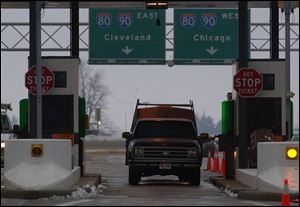
Workers reject pact, may strike on Jan. 21
1/12/2005
Toll collectors could go on strike later this month if a new labor agreement is not reached, but the turnpike commission plans to keep the roadway open if a strike occurs.
The Ohio Turnpike's unionized toll collectors and maintenance workers could strike on Jan. 21 after rejecting a state fact finder's contract recommendations in a vote that was closer than it looked.
Ballots counted yesterday showed members of Teamsters Local 436 voted 497-151 against the three-year pact recommended by fact finder James M. Mancini, freeing the union to strike as soon as a 10-day notification period expires. Because Ohio labor law requires dissent from 60 percent of eligible union or management voters to reject a fact finder's report, however, the 497 negative votes were only two votes more than the minimum needed to reject it.
"Unless the parties come to an agreement within that time period, the turnpike will be shut down," Local 436 President Gary Tiboni announced in a statement released yesterday. The union said it was giving required strike notice to the Ohio Turnpike Commission and the State Employee Relations Board immediately, which means that the 10-day notice period could allow a strike as soon as Jan. 21.
By "shut down," Mr. Tiboni said he meant the union would set up picket lines at every turnpike entrance that it hopes will be honored by motorists, especially union truck drivers.
Gary Suhadolnik, the turnpike's executive director, said late yesterday afternoon that he had received no official notice of the union's vote but was "very disappointed" by word he had received informally that the union had rejected the fact finder's report.
He vowed that the toll road will remain open if Local 436 walks out, but declined to elaborate."We have a plan to collect tolls and maintain the road," Mr. Suhadolnik said. "As the plan is needed, it will unfold."
If a strike becomes a reality, the Ohio Turnpike Commission previously approved implementation of a flat toll schedule of $10 for big trucks, $5 for buses and light trucks, and $1 for passenger vehicles regardless of distance traveled on the 241-mile highway. Passenger vehicles using the turnpike's Ready Toll debit cards would be charged 50 cents.
The commission also authorized turnpike administration to hire temporary replacement workers if necessary. The bargaining unit that Local 436 represents has a total of about 995 workers, but about 170 workers are nonmembers who pay the union a fee to represent them in negotiations and are not eligible to vote.
Mr. Suhadolnik said he expects those nonmembers to be available to work if there is a strike, though he was not sure yesterday if they will be obligated to cross picket lines.
During a strike that started the day before Thanksgiving, the Pennsylvania Turnpike Commission collected no tolls for one day and then used management and nonunion employees to collect flat tolls for six days until a contract settlement was reached.
As he had on Monday, when the Ohio Turnpike Commission accepted the fact finder's report, Mr. Tiboni said yesterday the union's main objection concerns health coverage.
Under their current contract, which expires Jan. 17, turnpike workers receive full health benefits without any form of co-payment, and have the option of accepting a co-payment plan in exchange for a $250 annual payment from the turnpike.
The fact finder recommended that a new three-year contract eliminate free health care and require workers to choose to co-pay health expenses or pay the premium difference for a plan that requires no co-payment. For the most expensive family coverage, the premium difference for the full-coverage plan is estimated at $66 per month.
Mr. Tiboni said the union also objects to the fact finder's proposal for weekend scheduling procedures, but said that issue was relatively minor compared with health coverage.
During their vote Monday, several commission members objected to the fact finder's health coverage and wage recommendations as being too generous, especially when compared with other public employees such as those at the Ohio Department of Transportation.
Mr. Tiboni said the union had no problem with the report's proposed raises of 3.5 percent in the first year and 3 percent in the second and third years for full-time workers. Certain maintenance workers would also have received a further pay increase to put their wages on the same scale as that for full-time toll collectors.
The highest-paid toll collectors now make $20.24 per hour. Under the fact finder's recommendation that would rise to $22.23 in the contract's third year.
Maintenance workers whose top pay now ranges between $19.93 and $20.05 per hour also were to have reached $22.23 by the third year, while other classifications' top pay would increase from a current range of $17.37 to $25.22 per hour to between $19.08 and $27.69 per hour in the final year.
Part-time toll collectors, whose pay now tops out at $15.07 per hour, would be paid up to $16.72 per hour in the final year if they receive the 3.5 percent annual raises the fact-finder recommended.
Both sides professed a willingness yesterday to return to the negotiating table, though Mr. Suhadolnik said he believed it was the union's obligation to request new talks.
"Obviously, we're willing to meet," the turnpike director said.
"The ball is in their court, since we accepted [the fact finder's report] and they rejected it."
Mr. Tiboni said he expected SERB to direct the two sides to return to negotiations, "and we are more than willing to do that."
Contact David Patch at:
dpatch@theblade.com
or 419-724-6094.